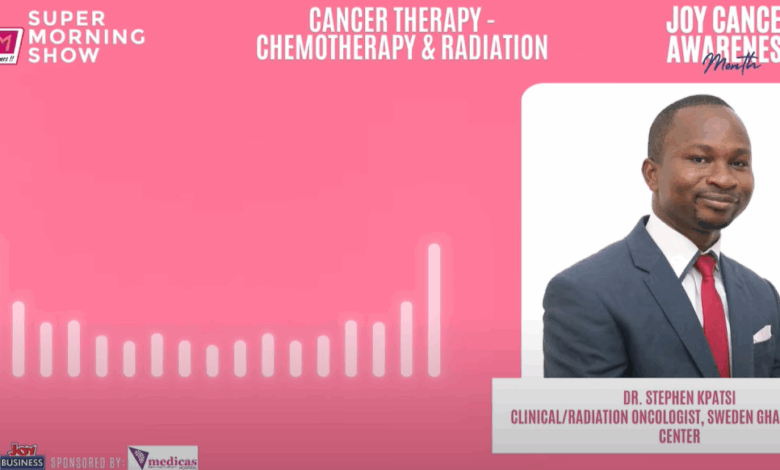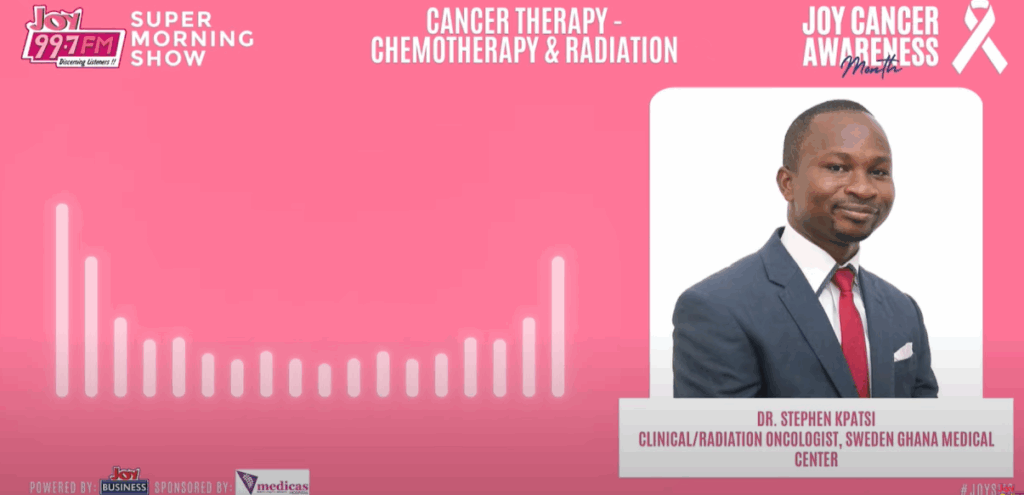Joy Cancer Awareness Month: Chemotherapy saves lives – Dr Stephen Kpatsi urges early treatment


Clinical and Radiation Oncologist at the Sweden Ghana Medical Centre, Dr Stephen Kpatsi, has emphasised the need for Ghanaians to seek early diagnosis and treatment for cancer, noting that chemotherapy and radiation therapy remain vital and effective treatment options.
Dr Kpatsi made the remarks when he appeared on Joy FM’s Super Morning Show on Thursday, October 9, as part of Joy FM’s ongoing Cancer Awareness Month Series. This episode focused on the topic “Cancer Therapy – Chemotherapy and Radiation.”
“If you notice anything unusual in your body, please don’t ignore it or wait too long. Reporting early could make all the difference, because cancer can be cured when detected early,” Dr Kpatsi advised.
According to Dr Kpatsi, cancer remains a major public health concern in Ghana. He used breast cancer as an example to illustrate the scale of the problem.
“In 2022, Ghana recorded over 5,000 new cases of breast cancer, and more than half, about 50% of those patients died from the disease,” he revealed.
He cautioned that the true picture may be worse because these numbers only reflect hospital-based data.
“There are many people who never make it to hospital and are not counted. If we could capture all cases, the statistics would be even more alarming,” he said.
Dr Kpatsi also cited the high number of liver cancer cases in Ghana.
“In 2022, there were 3,731 new liver cancer cases, and 3,362 people died from it in that same year. That tells you how aggressive it is,” he explained.
He added that breast cancer remains the most common in Ghana, followed by liver, cervical, prostate, and lymphoma cases.
He went on to explain chemotherapy in simple terms.
He added that chemotherapy can be administered in different forms, such as intravenous drips, tablets, or injections, depending on the type of cancer and its stage. And explained that Chemotherapy is the name given to drugs used to treat cancer, just like we use antimalarial drugs for malaria.
“The choice of drug depends on the cancer type, its biological features, and how far it has spread,” he said.
Dr Kpatsi observed that Ghana’s cancer burden is rising due to both improved detection and lifestyle changes.
“Years ago, people in the villages would say a relative just passed away suddenly, and we never knew the cause. It’s possible that many of those were cancer cases that went undiagnosed,” he said.
He noted that as awareness and diagnostic tools improve, more cases are being identified a sign that the health system must prepare to handle the growing numbers.
Dr Kpatsi stated the importance of early detection, proper treatment, and public awareness.
“The earlier we find it, the easier it is to treat. We have the specialists, the facilities, and the treatments here in Ghana. What we need now is for people to come forward early,” he said.
Dr Kpatsi acknowledged that the word “chemotherapy” often frightens people because of the side effects they have heard about. He explained that understanding why these side effects occur can help reduce fear.
“Chemotherapy medicines are designed to target cancer cells, which grow very fast. But there are also some normal cells in the body, such as those in the hair, mouth, and blood, that grow quickly too. These normal cells can also be affected,” he said.
As a result, patients may experience hair loss, nausea, vomiting, mouth sores, skin tone changes, darkened nails, and tiredness.
Dr Kpatsi, however, assured patients that most side effects are temporary and manageable.
“Hair loss is reversible. Your hair will grow back after treatment. I always tell my patients that it’s not permanent, it’s only for a short period.”
DISCLAIMER: The Views, Comments, Opinions, Contributions and Statements made by Readers and Contributors on this platform do not necessarily represent the views or policy of Multimedia Group Limited.
DISCLAIMER: The Views, Comments, Opinions, Contributions and Statements made by Readers and Contributors on this platform do not necessarily represent the views or policy of Multimedia Group Limited.
Source link





